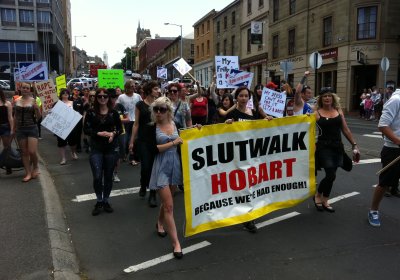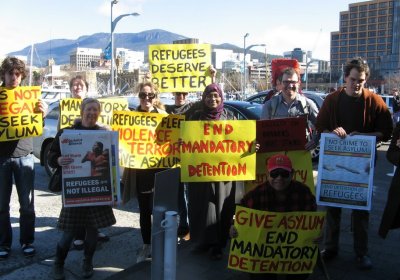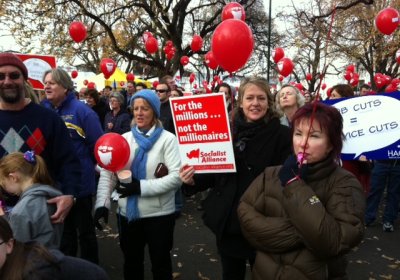Hundreds of people marched on November 12 in Hobart’s “Slutwalk” to protest violence against women and to reject the idea that victims of sexual violence are somehow responsible for the assaults against them because of what they wear.
nipaluna/Hobart
Community and Public Sector Union Tasmania general secretary Tom Lynch gave the speech below to a 4500-strong rally in Hobart on November 12. The rally was held in protest at the Labor-Greens state government’s budget cutbacks.
* * *
While external forces often determine the overall direction a government takes, the path it chooses to get there is for it to determine based on its values and beliefs and the will of the people it represents.
About 4500 people marched and rallied in Hobart on November 12 against the state government cuts to essential services.
Angry health care, education, children's services and other public sector workers, including police, joined with the broader community to chant "no more cuts", drowning out the efforts of Labor Premier Lara Giddings who tried to convince them that the government had no other option.
Greens leader and cabinet minister Nick McKim was also booed and heckled as he tried to defend the cuts.
Hundreds took to the streets of Hobart for the Inaugural Pride Parade on November 5 as part of the TasPride Festival. This was the first parade held since Tasmania was the final state to decriminalise homosexuality in 1997.
Tasmanian Aboriginal lesbian, gay, bisexual, transgender and intersex members also marched.
Speakers at the rally afterwards at Parliament House included Tasmanian Gay and Lesbian Rights Group spokesperson Rodney Croome, Outright Youth coordinator Joshua Brown, Community Services Minister Cassy O’Connor and Coming Out Proud president Julian Punch.
I am a member of Pulp the Mill, a group of peaceful community protesters who engage in civil disobedience to protest the politically corrupted Tamar Valley pulp mill assessment process in Tasmania.
Pulp the Mill has repeatedly called for a Royal Commission into this corrupted process, and in particular into Section 11 of the Pulp Mill Assessment Act 2007, a clause that removes the right of people to either claim compensation, or take legal action, should the pulp mill cause a negative impact on their health or livelihoods in any way whatsoever.
Nala Mansell-McKenna is a well-known Aboriginal political activist in Tasmania, who was recently elected state secretary of the Tasmanian Aboriginal Centre (TAC).
“We like to call the secretary the role that’s our main political spokesperson, but when you work in the same building as Michael Mansell you are usually the second main political spokesperson,” she laughed, referring to the way that Michael (her father) is frequently contacted for comment on political issues.
About 50 people attended a vigil on the parliament lawns in Hobart on September 16 in support of Ali Alishah, a jailed anti-pulp mill protester.
Alishah was arrested on September 5 at Gunns' proposed pulp mill site in the Tamar Valley in northern Tasmania after locking on to a truck that was entering the site. He has already spent almost two weeks in jail and will likely stay in custody until September 26.
A long-term forest campaigner, Alishah was taking action with the group Code Green, which has been conducting civil disobedience actions at the pulp mill site.
A group of protesters chanted "Refugees are welcome here, free the refugees" outside the Hotel Grand Chancellor on August 26 while Prime Minister Julia Gillard addressed the Institute of Public Administration conference inside.
The Socialist Alliance’s Jenny Forward told the rally: “With Pontville Detention Centre about to open down here, we want to keep the pressure up on the government to come up with a much more humane approach to refugee processing and resettlement.
In a new twist to Tasmania’s forest industry crisis, two wealthy environmentalists, Graeme Woods and Jan Cameron, have bought the Triabunna woodchip mill from notorious woodchipping company Gunns Ltd.
Gunns had almost stitched up a deal with a pro-logging company called Fibre Plus (owned by Aprin) but this fell through due to problems obtaining finance.
It’s been a fascinating few weeks in Tasmanian politics.
On June 16, the Labor-Greens government handed down a shocking budget that cut funding to public health, education, police and other services.
Thousands of public service workers gathered on parliament lawns that day to condemn the plan, saying that services were already struggling to meet demand.
The education cuts included a plan to close 20 schools. Education minister and Greens leader Nick McKim started a process of “consultation” with affected school communities around the state.
Unions Tasmania President Roz Madsen gave the speech below at a large June 16 rally outside the Tasmanian parliament — the day Tasmanian premier Lara Giddings announced a harsh new budget.
* * *
Not so long ago, politicians and political parties were fairly predictable. People entered politics on one side or the other, based on a set of values they held personally and then they pursued outcomes designed to fulfill those values.
About 3000 people rallied outside Tasmania’s parliament house on June 16 to protest a harsh budget handed down by the ALP-Greens coalition government.
Up to 1700 public sector workers will lose their jobs and 20 schools will close under the government’s plans.
- Previous page
- Page 5
- Next page











